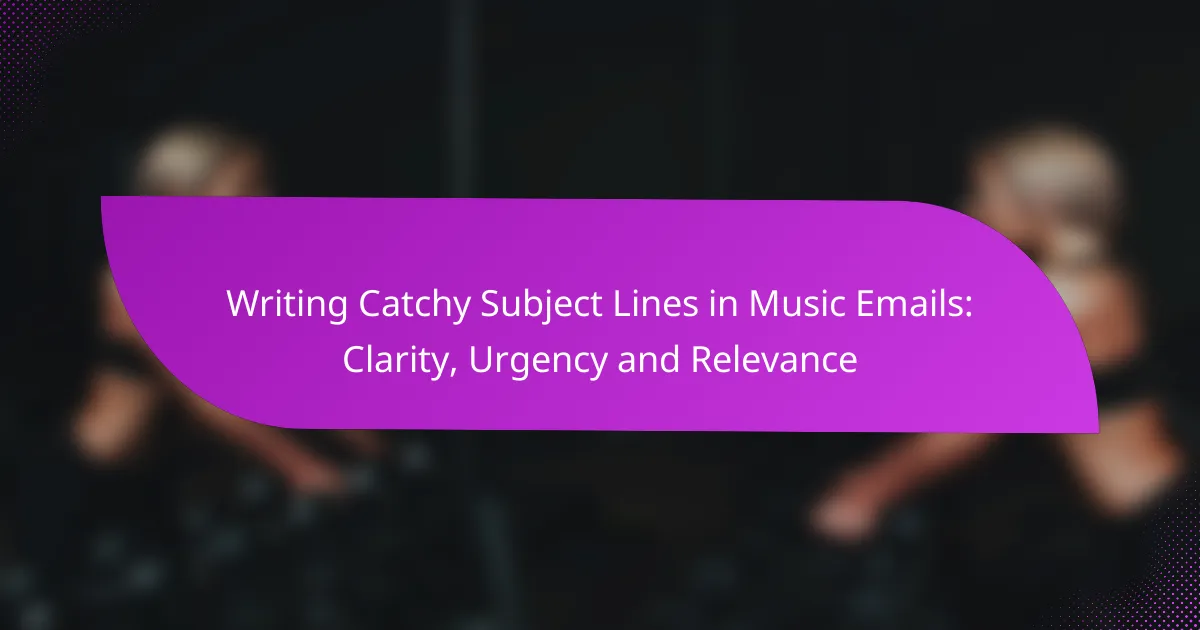Crafting catchy subject lines for music emails is essential for capturing your audience’s attention and boosting engagement. By focusing on clarity, urgency, and relevance, you can create messages that not only stand out but also encourage recipients to take action. Incorporating specific details about upcoming releases or exclusive offers can further enhance the effectiveness of your subject lines.
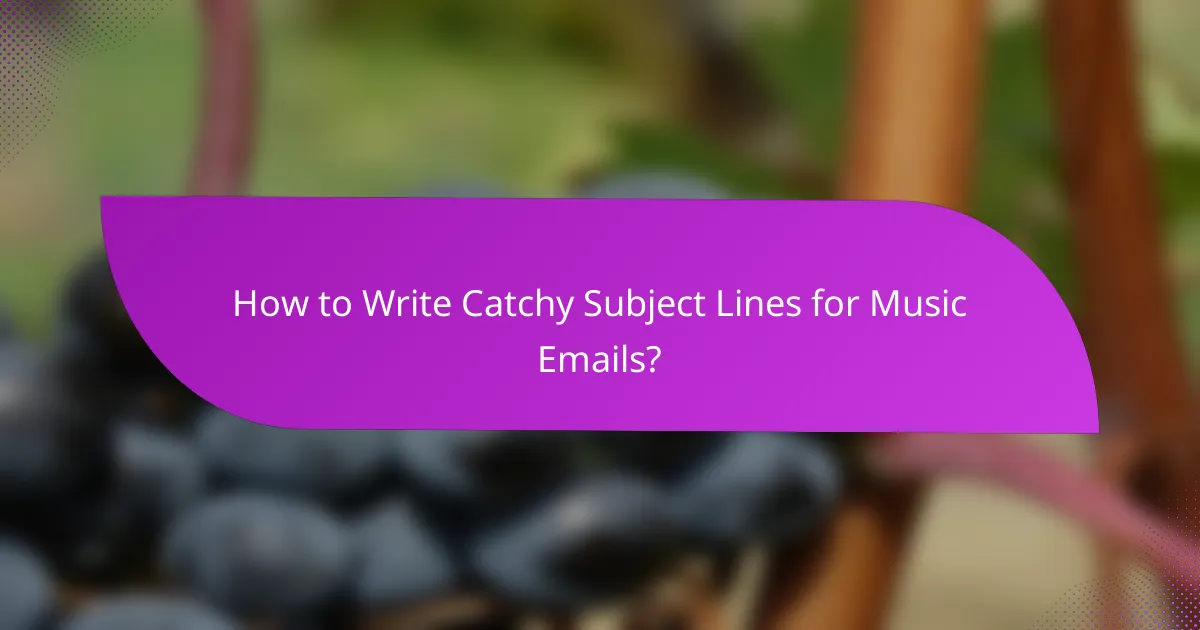
How to Write Catchy Subject Lines for Music Emails?
Writing catchy subject lines for music emails involves crafting clear, urgent, and relevant messages that grab attention. A well-structured subject line can significantly increase open rates and engagement with your audience.
Focus on Clarity
Clarity is essential in subject lines; your audience should immediately understand the email’s purpose. Use straightforward language and avoid jargon that might confuse recipients. For example, instead of saying “Exciting News from Your Favorite Band,” specify “New Album Release from The Band on March 15.”
Keep subject lines concise, ideally under 50 characters, to ensure they display fully on most devices. Clear subject lines help set expectations and encourage recipients to open the email.
Create a Sense of Urgency
Creating urgency in your subject lines can prompt immediate action from your audience. Phrases like “Limited Time Offer” or “Last Chance to Buy Tickets” can motivate recipients to open your email without delay. For instance, “Only 24 Hours Left to Get Your Concert Tickets!” conveys urgency effectively.
Be cautious not to overuse urgency, as it can lead to email fatigue. Reserve urgent messages for truly time-sensitive information to maintain credibility and interest.
Ensure Relevance to the Audience
Relevance is crucial for capturing your audience’s interest. Tailor your subject lines to reflect the preferences and behaviors of your target demographic. For example, if your audience loves indie music, a subject line like “Discover the Hottest Indie Tracks of 2023” will resonate more than a generic message.
Consider segmenting your email list based on listener habits, location, or past interactions to enhance relevance. This approach increases the likelihood of your emails being opened and acted upon.
Use Personalization Techniques
Personalization can significantly improve engagement rates. Incorporate the recipient’s name or reference their past interactions in the subject line, such as “Hey Sarah, Check Out Your Exclusive Pre-Sale Tickets!” This makes the email feel more tailored and inviting.
Utilizing data from your audience’s preferences can help create more personalized subject lines. For example, if a subscriber frequently listens to a specific genre, mention that genre in the subject line to capture their attention.
Incorporate Actionable Language
Using actionable language encourages recipients to take the desired action. Phrases like “Join Us,” “Get Your Tickets,” or “Listen Now” create a clear call to action. For example, “Grab Your Tickets for the Summer Festival Today!” prompts immediate response.
Ensure that the action you want the reader to take is clear and compelling. Avoid vague language that may leave the audience unsure about what to do next.
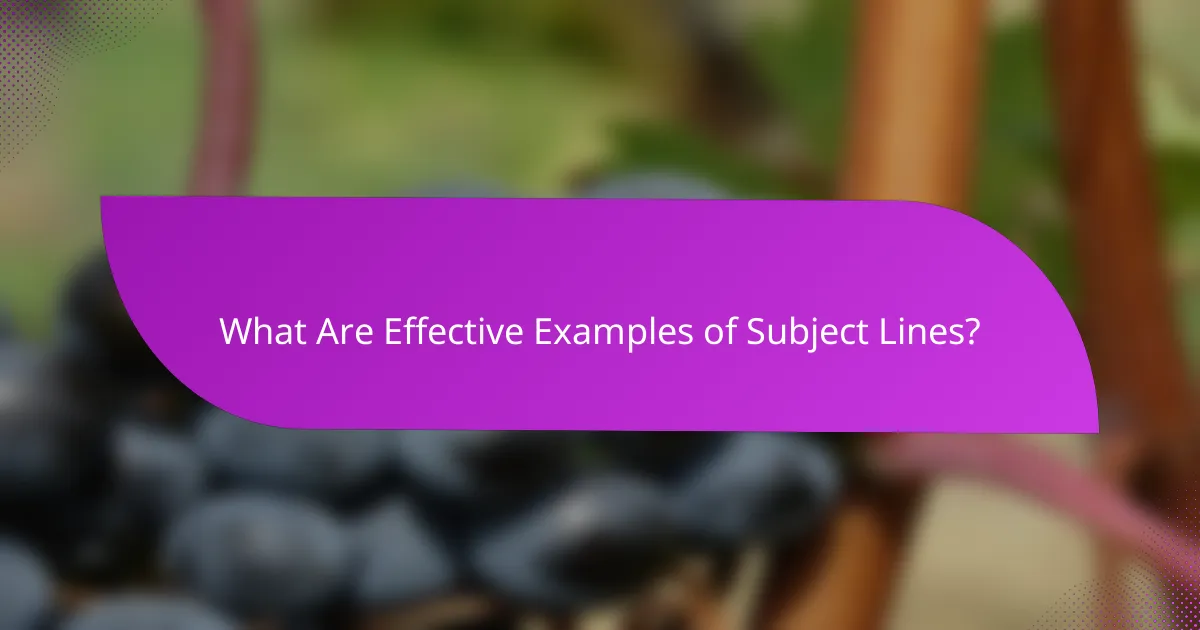
What Are Effective Examples of Subject Lines?
Effective subject lines in music emails are clear, urgent, and relevant, capturing the recipient’s attention and prompting action. They often include specific details about the content, such as upcoming releases, exclusive offers, or limited-time events.
Examples from Popular Music Artists
Popular music artists often use subject lines that create excitement and a sense of urgency. For instance, “Don’t Miss My New Album Release This Friday!” or “Exclusive Pre-Sale for My Concert – Limited Tickets!” These examples highlight the release date and exclusivity, encouraging fans to act quickly.
Another effective approach is personalizing subject lines, such as “Hey [Name], Your VIP Access Awaits!” This creates a direct connection with the recipient, making them feel valued and more likely to engage.
Industry-Specific Subject Lines
In the music industry, subject lines can vary based on the target audience. For example, a label might use “New Artist Signing Announcement – Discover [Artist Name]!” to generate interest among industry professionals. Meanwhile, a promotional email might state “Limited Edition Vinyl Available Now!” to attract collectors.
Using industry jargon can also enhance relevance. Phrases like “Chart-Topping Hit” or “Grammy Nominated” resonate well with fans and industry insiders alike, making the content feel more credible and appealing.
Successful Campaigns Analysis
Analyzing successful email campaigns reveals common traits in effective subject lines. Campaigns that achieved high open rates often featured urgency, such as “Last Chance to Get Tickets!” or “Only 24 Hours Left for Exclusive Merch!” These phrases compel recipients to act quickly to avoid missing out.
Additionally, successful campaigns frequently incorporate personalization and segmentation. For instance, sending tailored messages based on previous purchases or concert attendance can significantly improve engagement rates. A/B testing different subject lines can also help identify what resonates best with your audience.
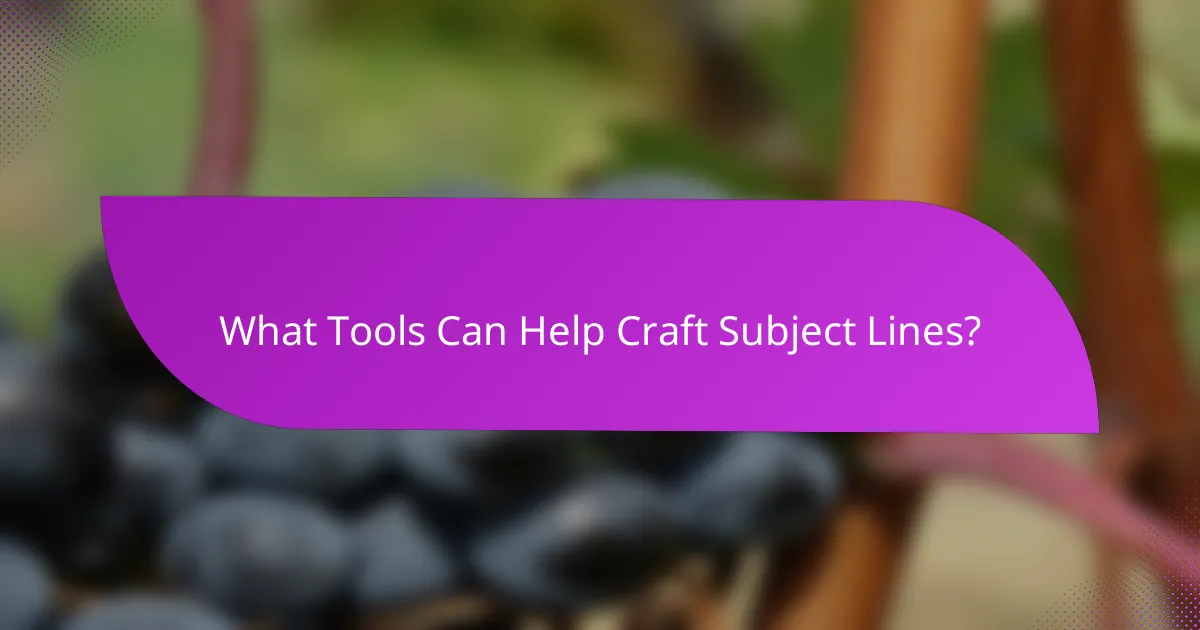
What Tools Can Help Craft Subject Lines?
Several tools can assist in crafting effective subject lines for music emails, focusing on clarity, urgency, and relevance. Utilizing these resources can enhance your email open rates by providing insights and suggestions tailored to your audience.
Mailchimp Subject Line Helper
Mailchimp’s Subject Line Helper is a user-friendly tool that offers real-time suggestions based on your input. It analyzes your subject line for length, tone, and engagement potential, helping you refine your message to better resonate with your audience.
When using this tool, aim for subject lines that are concise—ideally between 40-50 characters. Avoid using excessive punctuation or all caps, as these can trigger spam filters and reduce deliverability.
CoSchedule Headline Analyzer
The CoSchedule Headline Analyzer evaluates your subject lines based on various criteria, including word balance, sentiment, and length. It provides a score that indicates the effectiveness of your subject line, along with actionable tips for improvement.
To maximize your score, focus on incorporating emotional words and ensuring a good mix of common and uncommon terms. Aim for a score above 70 to increase your chances of engagement.
SubjectLine.com
SubjectLine.com offers a straightforward way to test your subject lines before sending. By entering your proposed line, you receive a score along with feedback on factors like spam potential and length.
For best results, keep your subject lines under 60 characters and avoid phrases that may be flagged as spam. Regularly testing different variations can help you identify what resonates best with your audience.
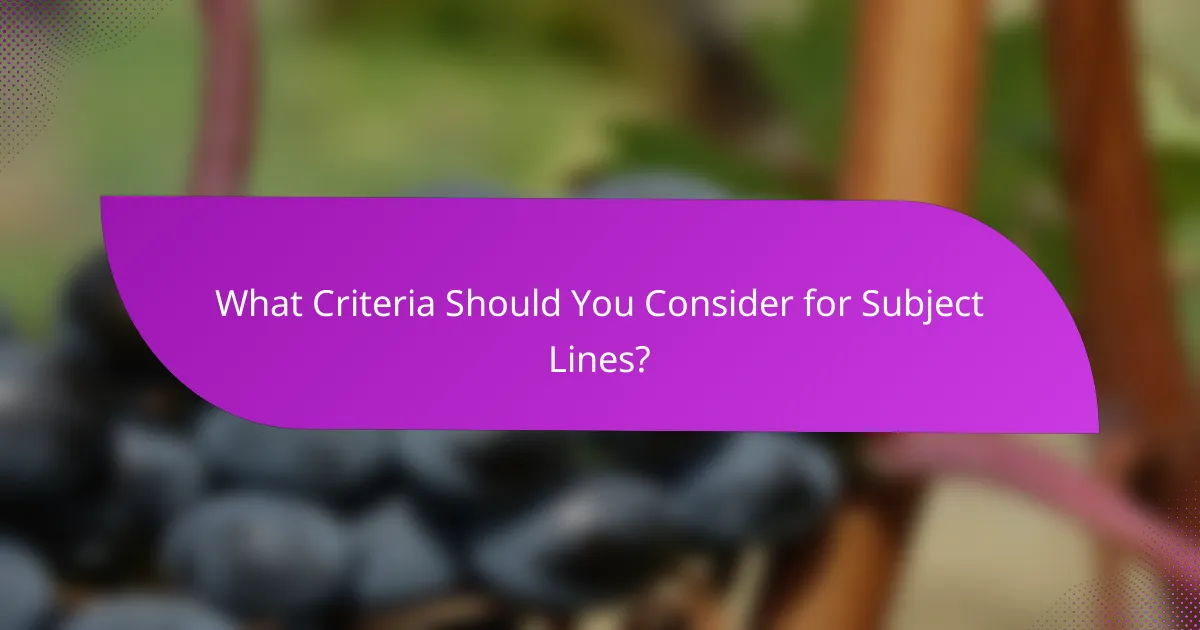
What Criteria Should You Consider for Subject Lines?
When crafting subject lines for music emails, clarity, urgency, and relevance are essential criteria. A well-structured subject line captures attention, conveys the email’s purpose, and encourages recipients to open it.
Target Audience Preferences
Understanding your target audience’s preferences is crucial for effective subject lines. Consider their age, musical tastes, and engagement habits. For example, younger audiences may respond better to playful language or emojis, while older demographics might prefer straightforward and professional tones.
Conducting surveys or analyzing past email performance can provide insights into what resonates with your audience. Tailor your subject lines to reflect their interests and preferences to improve open rates.
Timing and Frequency of Emails
The timing and frequency of your emails significantly influence the effectiveness of your subject lines. Sending emails during peak engagement times, such as early evenings or weekends, can increase visibility. Additionally, maintaining a consistent schedule helps your audience anticipate your emails.
Avoid overwhelming your subscribers with too many emails, as this can lead to unsubscribes. Aim for a balanced frequency, such as weekly or bi-weekly, and adjust based on audience feedback and engagement metrics.
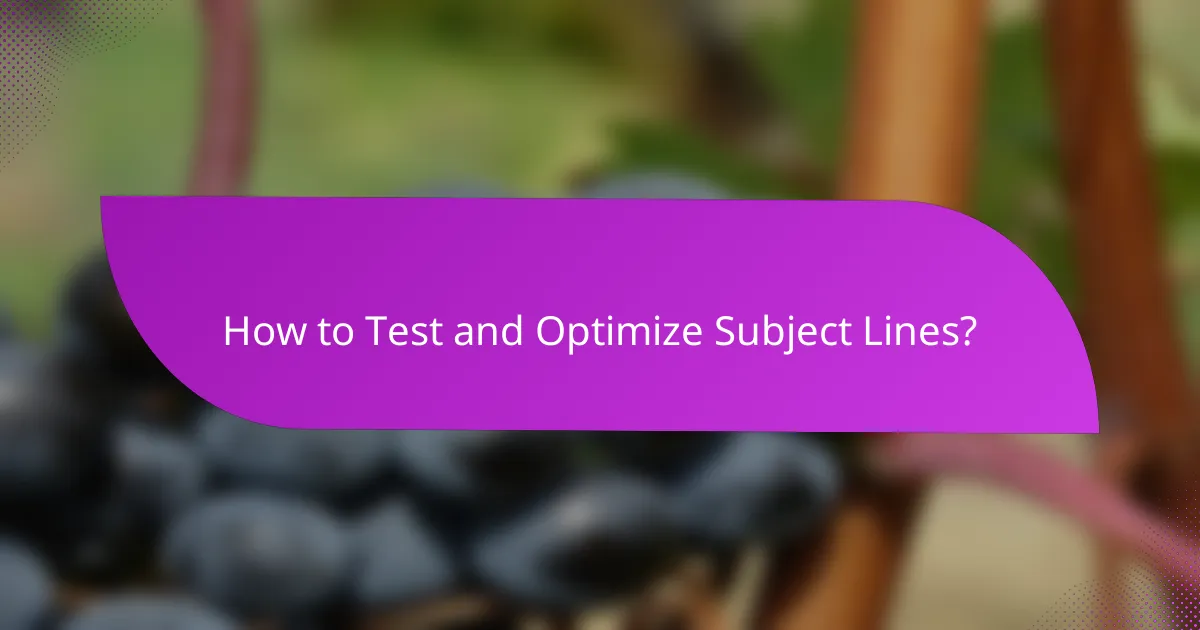
How to Test and Optimize Subject Lines?
Testing and optimizing subject lines involves using various strategies to determine which phrases resonate best with your audience. By employing methods like A/B testing, analyzing open rates, and gathering feedback, you can refine your email subject lines for maximum engagement.
A/B Testing Methods
A/B testing, or split testing, allows you to compare two or more subject lines to see which one performs better. Create variations of your subject line and send them to different segments of your audience. Ensure that the segments are similar in size and demographics to get accurate results.
When conducting A/B tests, consider testing one variable at a time, such as urgency or personalization. This focused approach helps isolate the impact of each change, allowing for clearer insights into what drives higher open rates.
Analyzing Open Rates
Open rates provide a direct measure of how effective your subject lines are at capturing attention. Track the percentage of recipients who open your emails after implementing new subject lines. A typical open rate can vary widely, but aiming for around 20-30% is a good benchmark in the music industry.
Use email marketing tools to analyze trends over time. Look for patterns in open rates related to specific subject lines, and adjust your strategy accordingly. If certain words or phrases consistently yield higher rates, consider incorporating them into future emails.
Feedback from Audience Engagement
Engaging with your audience can provide valuable insights into what they find appealing in subject lines. Encourage feedback through surveys or direct responses to your emails. Ask questions about what draws them in or what they would like to see more of.
Monitor social media and other platforms for comments about your emails. This qualitative data can complement quantitative metrics like open rates, helping you understand the emotional response your subject lines evoke. Use this feedback to refine your messaging and better connect with your audience.
